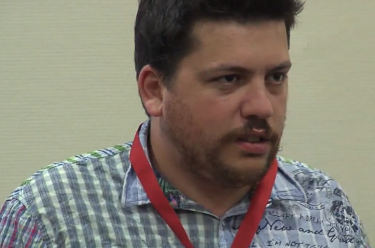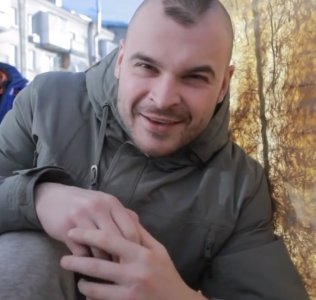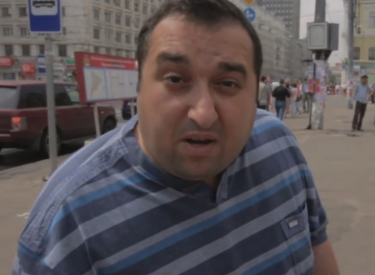Throughout the Moscow mayor’s race, Alexey Navalny’s campaign has taken a beating from all sides on questions about financing, nationalism, and even transparency. A wide array of government actors and pro-Kremlin interests have harassed him with allegations of illegal foreign funding and off-the-books campaign materials, and even fellow oppositionists worry about his potentially racist attitude toward migrant workers from the Russian south and near abroad.
Navalny now returns the favor.
Earlier today, August 19, 2013, Navalny’s campaign manager, Leonid Volkov, published [ru] on LiveJournal evidence that public relations professionals are behind several websites supposedly independent from Sergey Sobyanin’s mayoral campaign. After offering a brief tutorial in identifying in a website’s source code the origin of “like” widgets that track back to the Russian social network Vkontakte.ru, Volkov demonstrated that the same PR firm, “MakeIdea Inc,” sponsored the VK widgets embedded on two very different pro-Sobyanin web pages. (Since Volkov’s blog post, MakeIdea Inc has deleted both its widgets and VK page.)
The first website, called “Add Sobyanin!,” is a project from advertising photographer Igor Kublin [ru] that juxtaposes images of Moscow before and after Mayor Sobyanin’s tenure, showing visitors the city’s various improvements in recent years. (In a rather ingenious marketing ploy, this tactic pits Sobyanin against disgraced former Mayor Yuri Luzhkov, rather than his current rivals, which include Navalny.) The second website is titled “Test Navalny!” and it features a challenge from neo-Nazi Maksim Martsinkevich, popularly known as “Tesak,” daring Navalny to take a polygraph test while answering ten leading questions clearly intended to defame his reputation.
Volkov also highlights a third website that is ostensibly a protest effort, titled, “Anyone but Sobyanin!” The site (which hosts a short video of a man caricaturing a North Caucasian kiosk worker complaining about how Sobyanin cleaned up the city’s streets) is actually a transparent endeavor to celebrate Sobyanin’s work to reduce the presence of outdoor vendors in Moscow. “Anyone but Sobyanin!” featured a VK widget created by Mikhail Liubich [ru], a director at the marketing firm Agency One [ru], which Volkov points out once employed Alexey Goreslavsky, a publicist with established ties [ru] to government-friendly circles.
Volkov’s claims against the Sobyanin campaign intentionally mirror the charges Navalny has faced from others. The raid on the “Navalny Bros,” carried out at the behest of rival candidate Nikolai Levichev, was a smear attempt to show that Navalny uses unofficial henchmen, presumably to spend campaign funding acquired illicitly. Now it appears that Sobyanin’s reelection hopes also benefit from the work of suspicious “independent supporters.” To the detractors who often criticize Navalny for his nationalist sympathies, Volkov argues that his rival boasts fascist ties, pointing to the racist extremism inherent in “Anyone but Sobyanin!” and the campaign’s possible connection to a well-known neo-Nazi. “Sobyanin and Tesak — friends forever!” Volkov jokes.
As it turns out, this isn’t the first time Agency One has been involved in a website designed to boost the personality cult of a prominent Russian politician. In August 2011, Pavel Prianikov’s blog, “Tolkovatel” (Inquirer), ran a story [ru] about “Like-Putin.ru,” a webpage that still exists and features various games, where visitors can battle terrorists and put out wildfires, playing as Vladimir Putin. When asked who ordered the website, none other than Mikhail Liubich explained, “It’s just PR for our own agency,” denying rumors that the government paid Agency One to build the games.
With scandals so common in this year’s Moscow mayoral race, it’s hard to know if Volkov’s various pro-Sobyanin websites are indeed the work of a clandestine election campaign, or are instead, as Liubich once argued, the PR projects of scheming marketing agencies. For now, anyway, the Navalny campaign can revel in its own publicity coup, as it shows once again that the Russian authorities throw stones in glass houses.











3 comments